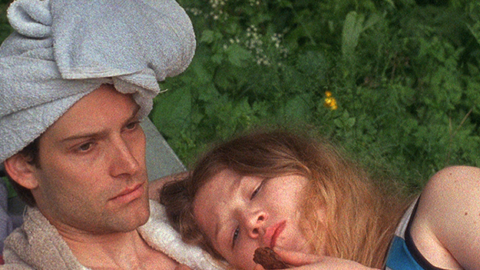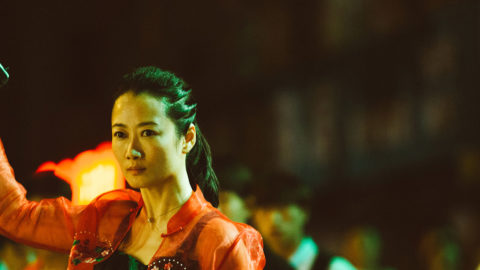Cannes Interview: Gabriel Abrantes & Daniel Schmidt
Over the past decade, directors Gabriel Abrantes and Daniel Schmidt, both 34, have collaborated with a host of left-field individuals. These artists, ranging from the like-minded Alexander Carver, Benjamin Crotty, and Alexandre Melo, to the anthropologically inclined Ben Rivers, go some way toward sketching the coordinates of their wide-ranging interests and vision. Despite their polygamous working methods, Abrantes and Schmidt have produced their most fruitful work as a duo, with their medium-length collaborations Palácios de Pena (2011) and A History of Mutual Respect (2010) approaching subjects as loaded as European colonialism and fascism through a distinctly postmodern prism that’s equal parts engaged and irreverent. Set in present-day Portugal (where Abrantes was born), the duo’s latest, the feature-length Diamantino, reorients the allegorical dimensions of their prior collaborations in favor of pure absurdist satire.
Starring Carloto Cotta (To Die Like a Man, Arabian Nights) as the eponymous diamond-cut soccer star, Diamantino has topical range that is humorously vast, touching on everything from Brexit to the ongoing refugee crises to consumerism to genetic science and gender modification. But it’s the media and its debilitating effects on consumer and celebrity identity alike that receives the most thorough critique. Like a mentally stunted and emotionally vulnerable riff on Cristiano Ronaldo, Diamantino excels on the soccer field, where, instead of green pitch and aggressive opponents he sees giant fluffy puppies and waves of pink clouds. But as his visions mysteriously subside and his skills diminish in turn, the Portuguese Secret Service, looking to exploit his skills and immaculate physique, plot to clone Diamantino and cast the original vessel to the wayside. Meanwhile, Diamantino’s twin sisters are scheming over their father’s nest egg while a lesbian undercover agent attempts to expose the family’s shady accounting practices even as she begins to fall for the newly breast-enhanced Diamantino.
Abrantes and Schmidt here manage to merge pre-Code sex hijinks, queer irreverence, and pop-art anachronisms into a dazzling, day-glo, sci-fi romance—an ambitious undertaking that hardly lacks for talking points. Shooting on richly textured 16mm celluloid, the directors continue to cut analog beauty with striking digital detritus gathered from all corners of the pop-culture landscape. Completely at odds with prevailing cinematic trends, Abrantes and Schmidt’s artisanal aesthetic continues to exhibit an altogether singular sensibility—something, as Abrantes suggests below, we might call “micro-weird.”
Following Diamantino’s premiere in the Critics’ Week program at the 2018 Cannes Film Festival, where it won the section’s top prize, Abrantes and Schmidt joined Film Comment for an afternoon at the beach to discuss their curious place within the star-driven festival ecosystem, their intuitive approach to humor, and their film’s topical outlook. [Diamantino screens October 4 and 5 in Projections at the 56th New York Film Festival.]

This is a fairly atypical film to see in the self-serious world of Cannes.
Gabriel Abrantes: What I’ve heard is that Cannes this year was trying to revamp. They took Yann Gonzalez’s film [Knife + Heart] in official competition, so maybe a reappraisal is going on. For us, I feel like we felt some resistance to our films from people who are more used to the self-serious kind of cinema that you’re talking about, but I think we also just really like films that mix serious topics with low culture/pop culture and satire with comedy—we really believe in that. And a lot of the directors that we love work in that same register, and so I think we’re pretty confident about that. We always get sad when we feel misunderstood, but…
Daniel Schmidt: But it is nice to play, not necessarily the black sheep, but to bring something different. One of the things that I can use as sort of a crutch for my confidence is that even if we make mistakes or make a bad movie, we’re not somehow repeating the mistakes of everyone who’s come before. It’s our own movie. But also here it’s easy to get sucked into looking solely at the Cannes of the last five years—when the three of us, given our ages, have been more aware of the festival. If you look at the arc of the festival, over however many decades, they’ve championed of bunch of really fucking crazy stuff. I don’t know if that’s necessarily the term I’d want to use for our film, but I know we don’t feel alone in the history of those trying to make some new images, some new proposals of cinema. And some entertainment.
Each of you often co-direct with other filmmakers. At what point in the process do you decide if and with whom you’d like to collaborate? How did the idea for Diamantino expand from its initial conception?
Abrantes: I think we have a special working relationship. We’ve done three films together. We didn’t know each other when we did the first film, other than as acquaintances. By chance and also by force, we became very good friends. We share a lot of the same references. And Daniel brings a lot of things that I should know about, but don’t. One summer—I think the summer when we were writing this—he introduced me to Stanley Cavell’s [Pursuits of Happiness:] TheHollywood Comedy of Remarriage and he was showing me all those films, like Bringing Up Baby and His Girl Friday. And so he sort of engendered the project, saying let’s make a romantic comedy about a couple not meant to be together but who find love at the end. When he showed me all these references I immediately fell in love with them. The first time I saw any Lubitsch was in Locarno at their retrospective.
Schmidt: Oh yeah, we watched so many of those—it was so nice.
Abrantes: It was Daniel that took me to those, and Lubitsch became one of the biggest influences on this film—it’s sort of like To Be or Not to Be as a satirical comedy.
Schmidt: There’s another version of the script, a fairly early version, where we were just plagiarizing Trouble in Paradise.
Abrantes: Yeah, as if it were just another romantic comedy or something. But a certain point we decided to shoot in Portugal. I really wanted to work with Carloto, who I had worked with on The Hunchback [2016]. In that film he dies in the first five minutes, but I was shocked at how this guy, playing a corpse, was still one of the most inventive actors on set. He was like, “Carry my body this way. Put my arm this way. Let my head fall this way, so I twist,” like he’s choreographing the way people carry his body.
Schmidt: And there’s our mutual fascination with pop culture, and therefore cinema. We’re still operating on the margins of the industry, but we’re still trying to play with the codes of it. I think we both had that affinity and interest in sort of playing with and perverting that language. And with this film, there was a desire to deal with the politics of today—or whenever we were conceiving it, 2015 or whenever. I don’t know who came up with the idea, but we were becoming increasingly interested in celebrity culture and how sociopolitical and very topical elements are sort of filtered through or distorted by icons of enormous stature like Lance Armstrong or Ronaldo or Madonna.
Abrantes: People always try to divide the tasks by directors, and in some of my collaborations it has been far more divided, but with Daniel it’s like a symbiotic relationship, right from A History of Mutual Respect. I had gotten that project on its feet: I had won a prize for Too Many Daddies, Mommies and Babies [2009], a short I did…
Schmidt: Best title of all the films!
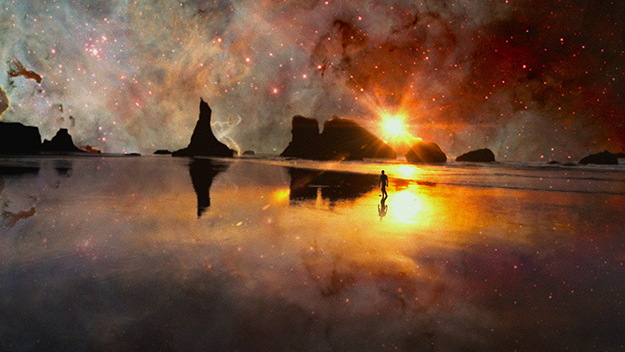
Abrantes: [Laughs] And I used that money to fund History. From there I invited Daniel, who I didn’t know him very well, and we immediately found our way of working. Originally it was set in Brazil, a story about these two rich kids who had burned an indigenous leader who was meeting their father. He was sleeping at a bus station, and these kids decide to do a prank and light what they think is a homeless person on fire. Not a prank [laughs]… a violent crime! I heard this true story and it really inspired me: the irony of a guy, a leader of an indigenous community, who’s going to meet these kids’ father, who’s an important political figure himself. I told Daniel, and he immediately said, “No, I don’t want to do this violent burning thing, it’s gross. I’m not interested in that story.” And I just accepted his criticism blindly. I was like “Okay, yeah, absolutely.” But we still kept the two privileged kids, which is who we play in that film. That’s the sort of working relationship we have.
Schmidt: Rather than having this sort of hyper-violence, Jackass-type things of kids lighting people on fire and killing people, it was like: it’s two young guys who have this delusional, very soft philosophical way of thinking, where they want to sleep with the indigenous women because they’re pure—using perversity to provoke rather than violence.
Abrantes: The provocation of the proposal was that we took the side of the bad guys, of the privileged assholes or douchebags who are the main characters of the film. We thought framing that kind of story in a sort of indie-poetic style would be quite perverse. But anyway, that’s all to say that I’m from Portugal, and that’s why we shoot there. I’ll propose something, Daniel will rebound off of it. He’ll propose something, I’ll rebound off of it. So it’s super organic in the end—there’s no other way to say it.
Schmidt: And we just keep talking and the interviewer can never say anything! [Laughs]
So in your films together there really isn’t any division of labor, on set or otherwise?
Abrantes: No, the only thing I do more of is production.
How does it differ working with Daniel than your collaborators?
Abrantes: It’s super different. I work with Katie Widloski, with Benjamin Crotty, with Ben Rivers, with Alexandre Melo. And some of those people, like Melo for example: he’s a curator—he was almost like a tourist director, it was his first experience. With Rivers, it was very strange because Ben has a super-established practice that I love. But with Daniel, we started together. So with Rivers we’re confronting two ways of working and we’re trying to negotiate a space where we’re both working within both of our practices, but together. Even the scripts for the films that I’ve done by myself: I always send them to Daniel and he’ll edit them and I won’t even review his edits. I’ll just be like [mimics typing motion]: “accept,” “delete,” in review change mode or whatever. So I really trust Daniel. I think my films with him are better in a lot of ways than the films I do by myself, and it’s because of this confidence that he gives me to take certain risks.
Schmidt: There’s that hierarchical structure where one person is in command—and as a director you are directing a bunch of other people—but I think that’s sort of taken for granted. And I don’t think that’s necessarily a bad model, but I think it’s something you can question. If by having two of us there’s a conversation of what the film can be, that can somehow be more generous or more emboldening.
Abrantes: It’s a dialogue.
Schmidt: And even more fun for us than if it’s just one of us alone at the top being like, “Okay, I’ve gotta have the balls or the clarity of mind or the whatever—the singularity of mind to deliver something.” I think the contrast of that is these sort of TV shows or whatever, or Marvel movies, where there’s like 20 people in a writers’ room. I think that’s also a fascinating and valid way of making something, but I’m sure it has its own pitfalls. So we’re kind of working in some sort of intermediate zone.
Can you tell us about conceptualizing the character of Diamantino? Many people have pointed out the similarities to Cristiano Ronaldo, who you mentioned earlier.
Schmidt: I don’t know exactly at what point it came into our development of the film, but there are two David Foster Wallace texts that we’re fans of. They’re both tennis texts, one’s called “Roger Federer as Religious Experience,” and one is called “How Tracy Austin Broke My Heart.” One is how sports is the 21st- or late-20th-century version of religion that has superseded art, as the way for the masses to connect to some sort of understanding of something superhuman—that humans could do something beyond what anyone else could believe and that was previously occupied by the arts, whether Michelangelo or whatever, and their ability to create realism, whether it’s sculpture or painting. That essay is really beautiful and Wallace talks about tennis in a really beautiful, loving, and also crazy particular way. So we were interested in Diamantino occupying that space as a sort of mythological, almost messiah-like character, even a sort of fairy-like character. And in the “Tracy Austin” text, it’s almost like a sort of weird inverse, in which she was a young prodigal tennis star—at age 14 she’s already pro and on the cover of Tennis World—and Wallace is growing up at the same time as her. And after her career is over, he sees that she’s got one of these trashy paperback memoirs with a title like How Did I Do It? How Was I Such a Good Tennis Player?. And he buys it and he thinks it’s going to be trash and he reads it cover to cover, and it’s filled with all these super-vapid statements like, “There’s no ‘I’ in team,” “Family is so important,” “I didn’t care about the money,” “I love tennis”… and he realizes and sort of proposes this beautiful idea—and also damning idea depending on how you take it—which is that the curse or the reality of proficiency, of incredible proficiency and perfection on the court or in any other field of sport is a sort of emptiness of the mind.
Abrantes: Like the reason her memoir was so dumb is because she is empty inside and that’s why she’s so good on the court. And that’s a heartbreaking thing, to find that the secret to genius is actually something you have no access to because of its vapidity or emptiness. And that was the main thing that really inspired us, and we wanted to make a character based off of that.
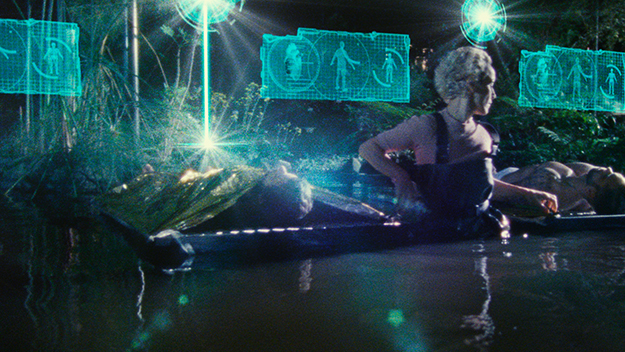
Have you guys seen In the Realm of Perfection?
Schmidt: Yeah, I just watched it like a week ago!
Abrantes: What is it?
Schmidt: It’s a [John] McEnroe essay film/documentary. It’s quite fascinating. I think we’re really drawn to these—not necessarily so much to sports, though we are fans—but to the way that cinema relates to sports, as another contingent thing. So Zidane or the antecedent to that, the film about George Best, or a kind of follow-up, the film about Kobe Bryant. The Mike Tyson documentary is also amazing.
Abrantes: Kobe’s Oscar-winning short was a big inspiration. [Laughs] But just to follow up on that, this was at the same time we decided to do something with Carloto. And the way he picked up on the character… the reference that we gave him was Forrest Gump.
Schmidt: And Zac Efron. [Laughs]
Abrantes: He really took that and built a very beautiful character—he brought more than 50 percent. We wrote the lines, we wrote the scenes, but every single scene…
Schmidt: He invented a lot.
Abrantes: Yeah. There’s a scene where he blows a goodnight kiss to his son and he does the whole soccer gesture where he’s juggling the ball on his head and his knees and stuff. And he didn’t even tell us that he was gonna do that! He just brought that kind of thing.
Schmidt: This was charming on set, and it created an energy in the realm of shooting, which I think helped us a lot. He was kind of the savior of the film. There was a sort of analogue between the character we were trying to create and Carloto as a performer. He’s not an idiot savant, but he has a very, very particular way of method acting. He’s hyper-intelligent but then he seems kind of in his own puppy world when he’s acting or even when he’s getting drinks with you.
Abrantes: He has some form of autism for sure. [Laughs] I say that in a good way!
Your prior two films together dealt largely with the past, or at least played as allegories of Portugal’s colonialist history. Diamantino feels much more contemporary in its concerns.
Schmidt: I think things have become more urgent! I think it’s because of the time. Like obviously post-9/11, or even pre-9/11, there’s always been an urgency, there’s always just awful things that are happening, there’s always something that can be said or something that can be attempted to be said about the present condition. But I think as we were making the film—Trump was literally elected in the middle of the shoot and Brexit had happened a few months before—there was a desire to deal with things that were really frightening to us and also to challenge ourselves. It’s great to make films, and we would have really enjoyed making a film that critiques and questions and plays with the Inquisition, or plays with the Cultural Revolution, but I think doing something that was very topical was important for us as a way to deal with fears, and hopefully do something that… or at least see what happens. It’s an experiment.
Abrantes: The interest that we had in A History of Mutual Respect or Palácios de Pena was to make something about the way a cultural or national inheritance affected the next generation, how colonial histories are still being played out through these two idiots in Brazil, in history, or how these privileged teens were basically reenacting the Inquisition unconsciously. Like their grandmother is a fascist, their grandmother dreams that she was an inquisitor or whatever, and this film was very similar: we wanted to see how soccer and nationalism today is a reflection of these hyper-violent histories of Portugal.
Inheritance plays an interesting role in your films. The sisters in Palácios de Pena and Diamantino are both quite greedy. Where did the idea for the evil twin sisters in Diamantino come from?
Schmidt: I think with the Palácios sisters, we were looking at youth culture and how there’s a sort of unconscious adoption of a sort of fascist or Inquisition past and how this sort of history of violence can be passed down to people who are 12 and 13 years old.
Abrantes: The joke was how tweens can be the Inquisitors of 2011 or whatever.
Schmidt: With the twins in Diamantino, I think it’s a different type of thing, which is an interest in playing with stock characters of sort of fairy tales—with every famous celebrity, there’s always someone or multiple people there to leech off them. I might be totally wrong, but like Britney’s father, or Whitney’s…
Abrantes: Or the mom in the Kardashians.
Schmidt: Yeah, Kris Jenner. She fascinates us—fascinates everyone, right? So we were interested in that and the twins just struck us. It was a more intuitive thing, like, wow, by having two of them it takes out the sort of interiority of this evildoer and it makes it this sort of thing you delight in yet are also kind of repulsed by. It also just makes a very quick echo of a fairy tale, like Drizella and Anastasia from Cinderella. I think that that was something more intuitive than super planned out. The two actors who played the twins, [real-life sisters] Anabela and Margarida Moreira, had never acted together.
Abrantes: A lot of Portuguese people weren’t aware that these were twin actresses and thought it was a special effect.
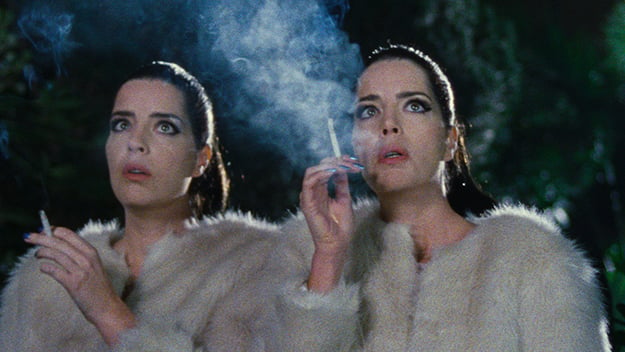
Your films’ visual palettes seem to pull from many disparate sources. Here again you’re combining the analog with the hyper-digital imagery that seems as much sourced from pop culture and the Internet as the recesses of your unconscious. Were there any specific influences on this film?
Abrantes: Yeah, there’s this contemporary painter Will Cotton—he had a show I saw that is a bunch of ironic pin-up girls in a landscape of chocolate ice cream or cotton candy, and cheesecake, and so that was the first inspiration for this kind of world. And then we wanted to make a sort of silly, desexualized version of that, where it’s puppies. But I think we have a way of working that’s sort of intuitive. We have a very wide range in tastes, from art to drama to cinema—and cinema from the beginning of cinema to the trashiest TV shows possible. And we’re sort of gluttonous and omnivorous.
Schmidt: It’s like a “more is more” type thing, so we’re adding too many things, especially because there are two of us. Once we finish the script, we try to cut out some of that or add some more, and then when you’re shooting you’re coming up with ideas, and Gabe’s coming up with great ideas, and the actors are coming up with great ideas.
Other than the violence mentioned earlier, is anything off limits? Is anything too dumb?
Abrantes: We censor each other a lot. I know Daniel wasn’t really into the scene where the sisters beat up [the undercover agent] Aisha. I’m very interested in representations of violence on screen; Daniel far less so. But I think it’s a really haphazard thing where it’s very intuitive as well as just shooting ideas off each other. He’ll throw an idea of mine away, and I’ll be like, “No that’s dumb.” Or I’ll say something and he’ll build it up to something that’s actually usable.
Schmidt: I think for me it’s like what we were talking about with A History of Mutual Respect, or other things even in Diamantino: the way the character Giselle deals with Diamantino, or the way that the Brexit ad is utilized. These are also acts of violence, but because they’re done in this sort of playful, absurd way, I’m not averse to it. But I just don’t feel as fluent in it. I think it can be an easy trap because it’s such a cornerstone of cinema.
One of the aesthetic motifs in your work is the mixing of analog technology with this cheap, lo-fi visual palette. There’s humor in the fact that you’re spending the time and money to shoot on 16mm, while much of the effects feel handmade.
Schmidt: It creates a degree of suspension, like taking the audience and putting them in a different place, a hopefully altered state, which is one of the ambitions or possibilities of cinema. So hopefully you’re watching and you’re kind of like, “Oh, this isn’t just like 8K super-cool soccer footage, nor is it super-lovely 16mm Terrence Malicky whack-off shit or whatever.” It’s something caught in between, and I think that keeps the audience in a place of “Do I cry? Do I laugh?” that we find compelling.
Abrantes: We’re after something that gives you a funny feeling, like a drawing where one leg is a little too long or something—it gives you that feeling in your stomach that it’s not quite right.
Schmidt: The Portuguese team that did the effects is super-talented and great, but we’re still working with a limited budget and doing some of the compositing ourselves. Our effects are rough, both early cinema and early 2000s. Using 16mm kind of helped give everything a unified look and we put fake grain on the stuff that wasn’t.
Abrantes: That’s something I’m into. I’ve started doing more and more effects films and a lot of the DPs are like, “So are we gonna shoot on 8K or 20K or 5000K?” [Laughs] And I’m like,”No, this film I did on 16mm,” and then they look at it and they’re like, “Oh my god, it looks so good.” And I’m like, yes, because it’s so grainy and the quality is actually very reduced, the resolution, that when you put something else on top and you put grain on, it fits into the image or composites well. I really like doing 16mm with effects.
Schmidt: One of our MOs for making cinema is taking risks. Being amateurs, we’re able to afford ourselves a certain grace by doing stuff that’s never perfect. And so thereby we have been afforded a degree of forgiveness by the audience and by ourselves. It’s always going to be on what the budget can do. Even if it doesn’t look “right,” in scare quotes, it looks like something that’s compelling. And it’s this unfinished state of striving for a new image that we’re excited by.
Abrantes: Yeah, a handmade quality. A lot of the effects stuff is me going to YouTube and searching things like, “After-Effects tutorial best,” and then you get whatever effect comes up and I’ll spend like 20 hours learning how to do that effect. It might be a stupid thing, like a lightning bulb or particles or something like that, and then that’ll make its way into the film. But I think that handmade, experimental, amateur, artisan attitude toward making film is something that we really love, and I think that makes the images a bit surprising. We try to keep a hand in it, and that hand keeps it a bit messier.
Jordan Cronk is a critic and programmer based in Los Angeles. He runs Acropolis Cinema, a screening series for experimental and undistributed films, and is co-director of the Locarno in Los Angeles film festival.





